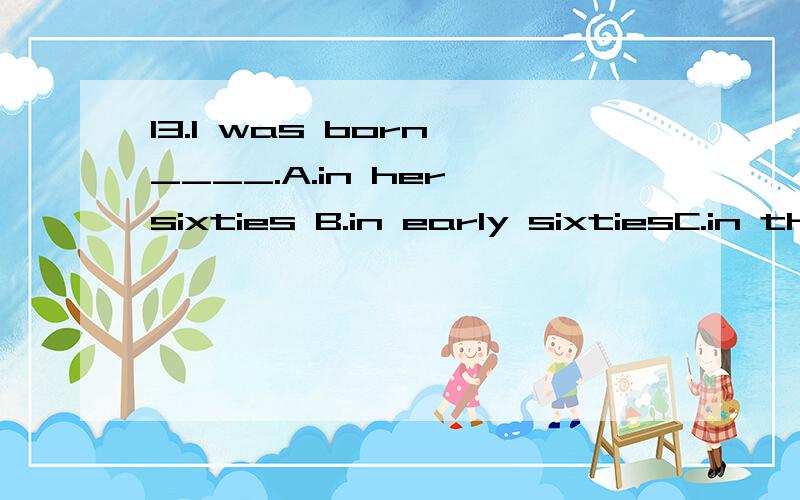13.I was born ____.A.in her sixties B.in early sixtiesC.in the sixtieth D.in the sixties14.He finished university in ____.A.twenty B.twentiesC.early twenties D.his early twenties15.The old man bought ____ eggs.A.three score B.three scoresC.three scor
来源:学生作业帮助网 编辑:作业帮 时间:2024/05/16 14:02:46

13.I was born ____.A.in her sixties B.in early sixtiesC.in the sixtieth D.in the sixties14.He finished university in ____.A.twenty B.twentiesC.early twenties D.his early twenties15.The old man bought ____ eggs.A.three score B.three scoresC.three scor
13.I was born ____.
A.in her sixties B.in early sixties
C.in the sixtieth D.in the sixties
14.He finished university in ____.
A.twenty B.twenties
C.early twenties D.his early twenties
15.The old man bought ____ eggs.
A.three score B.three scores
C.three scores of D.scores three
16.He wrote ____ article on computer.
A.a 800-word B.800-words
C.800-word D.an 800-word
17.The boy had ____ sheep to see to.
A.a lot of B.a large amount of
C.a great deal of D.a great many of
18.The police talked to him because he was ____ to enter the hall and the last to leave.
A.No.One B.one
C.the first D.first
19.Every year ____ students from this school are send to Britain to learn English.
A.six dozen B.six dozens
C.sixth dozen D.sixth dozen of
20.There’re 30 girls in our class,____ are from the country.
A.Three they B.The three of them
C.Three of them D.All three of them
13.I was born ____.A.in her sixties B.in early sixtiesC.in the sixtieth D.in the sixties14.He finished university in ____.A.twenty B.twentiesC.early twenties D.his early twenties15.The old man bought ____ eggs.A.three score B.three scoresC.three scor
13,D:固定用法,in the sixties,“六十年代”
14,D:“在他二十岁出头时”.在某人多少岁时的说法就是这样,twenties 前面要加上his/her/my等.
15,A:
数量词+SCORE+名词的时候不用OF
但是如果SCORE后面是代词比如THEM、THESE的话要用TWO SCORE OF THEM的形式
SCORES OF+名词 表示许多的含义了 此时SCORE要加“S”,其他时候不加
16,D:首先,像800-word这样中间加连字符的,那么后面那个名词就不能用复数,所以B是错的.第二,必须是wrote an article或worte the article,而不能只是worte article.最后,800的8发音是[e]原音开头,所以不定冠词必须是an,而不能是a.
17,A:四个答案中只有A是修饰可数名词,其余三个只能修饰不可数名词.而sheep是可数名词,只不过其单复数形式相同.
18,C:他是第一个...最高级应该加定冠词the,所以应该是 the first one to enter...其中one可以省略.
19,A:把dozen当作hundred来理解,两者的用法一样.
用作数词(一打,12个)时,即使前面的数词大于1,也用单数,比如:six hundred students(600个学生).表示很多个的时候才加S:hundreds of students(数百个学生)
20,C:可以说 three of them (其中三个),或是 all of them (他们全部),或是 none of them (他们一个都不).没什么道理,就是这样用的.
DDADAAA,最后一题不确定,应该选C
a
d
a
d
a
c
a
c